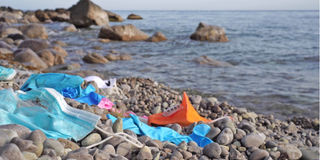Covid-19 gear keeps people safe, but not the Indian Ocean

As more people observe measures to prevent the spread of the coronavirus, masks, dirty wipes, sanitiser bottles and gloves end up in the streets and will ultimately reach the Indian ocean.
What you need to know:
- According to the study, Covid-19 related items contributed up to 16.5 per cent of the total marine litter pollution along the Kenyan coast.
- Eleven out of 14 streets surveyed recorded Covid-19 related litter as a result of improper disposal.
If you walk on many Kenyan streets today, you are likely to see poorly discarded masks, wipes and sanitiser bottles.
What you will see is a snapshot of a problem across the country and the world.
As more people observe measures to prevent the spread of the coronavirus, masks, dirty wipes, sanitiser bottles and gloves end up in the streets and will ultimately reach the Indian ocean.
A drastic increase in the use of masks and gloves and a decline in recycling programmes are threatening the health of the ocean.
A new study by the Kenya Marine and Fisheries Research Institute (KMFRI) has offered a glimpse into the negative impact of Covid-19 on the ocean.
Littered streets
The report on Science Direct is the most ambitious effort yet to estimate how much masks and other Covid-19 preventive measures have impacted the ocean.
According to the study, Covid-19 related items contributed up to 16.5 per cent of the total marine litter pollution along the Kenyan coast.
A group of KMFRI researchers, led by pollution expert Dr Eric Okuku, carried out studies on the contribution of the Covid-19 pandemic to marine pollution in Mombasa, Kilifi and Kwale counties in June.
This was 100 days after the first case was confirmed in Kenya.
According to the study, streets in Nyali, Mkomani, and Pirates areas in Mombasa County reported the highest number of Covid-19 related litter items compared to Kilifi and Kwale counties.
Eleven out of 14 streets surveyed recorded Covid-19 related litter as a result of improper disposal. The litter on the streets is of concern given that it can be washed into water bodies through surface runoff, thus adding to the number of macro-plastics in the ocean.
Plastic waste
For instance, the study says wet wipes are a source of white microplastic fibers in the marine environment that may enter the food chain.
“Litter can still be transported to the waterways (if not disposed of appropriately) through surface runoff particularly in the Kenyan coastal counties where consistent and sustainable waste disposal is still a challenge. Whereas medical facilities are equipped to deal with bio-hazardous waste, proper disposal of PPE from households is still a major concern,” said the report.
Previously, PPE debris has been reported on the seafloor of the Mediterranean, and masks were discovered underwater in the remote Soko islands bay beach, Hong Kong.
The researchers noted that although single-use PPEs have been regarded as effective in the fight against Covid-19, there are rising environmental concerns about their contribution to the plastic waste that is leaking to the environment.
Single-use masks contain plastic polymers such as polypropylene, polyurethane, and polyacrylonitrile; gloves are made of latex rubber which contains some chemical additives.
Research into the marine food chains suggests their plastics pose a significant threat to marine life in the form of microfibers that may be ingested and cause the biomagnification of toxins at higher levels of the food chain.



